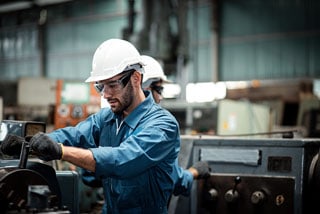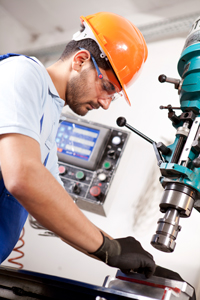Machining Schools with CNC Training Near You, Plus Vital Info on This Precision Trade
Are you interested in becoming a trusted and knowledgeable professional in advanced manufacturing? Schools offering CNC training near you can provide that opportunity. By learning how to work with computer numerical control machine technologies as a machinist, you could gain the expertise to create complex parts and instruments with precision. These parts could be for anything from cars and airplanes to industrial machinery and medical equipment, so it's vital that machinists take pride in the accuracy of their work.
This high-tech trade offers a real sense of accomplishment in a job that's well-executed. Machinists do hands-on work with raw materials, use complex computer programs, and operate CNC machines with the expertise required to turn blueprints into reality.
CNC Machine Training Details and FAQs
CNC machine training schools near you may offer short, skills-focused programs that can lead to a career in this satisfying trade that doesn't require any licensing.
CNC Machining Schools
Sponsored Listings

Spartan College of Aeronautics and Technology
- Tulsa, Oklahoma
- Nondestructive Testing Technology & Quality Control Management
HoHoKus School of Trade & Technical Sciences
- Paterson, New Jersey
- Manufacturing Technology
How long is CNC training?
It commonly takes 9 to 24 months to complete a program at a CNC machining school.
What education do I need to become a machinist?
Certificate programs typically take up to a year to complete. Some are designed for beginners while others are aimed at people who already have some training or experience in machining. In many cases, credits from certificate programs can be applied toward an associate degree.
Diploma and associate degree programs can take up to two years. They tend to be very similar, but an associate degree program usually includes a few additional general education courses.
Apprenticeship programs are also available. Going this route involves receiving in-class technical instruction as well as paid, supervised training on the job. Apprenticeships are often sponsored by unions, industry associations, or manufacturers. You can look for relevant opportunities through the U.S. Department of Labor.
Typical CNC courses
CNC classes near you will typically cover topics such as:
- Blueprint reading
- Precision measurement
- Machine setup, operation, and maintenance
- Geometric dimensioning and tolerancing (GD&T)
- Computer-aided design and manufacturing (CAD/CAM) applications
- Multi-axis milling and turning
- Programming
- Shop safety
Will I be tied to a fixed class schedule?
Not necessarily. Some CNC machinist schools offer courses in a hybrid online and in-person training format. And many offer flexible scheduling options that allow students to choose day or evening classes. It's worth researching CNC training near you to see what's available.
Skills you can learn
 Depending on the program you choose, learning how to become a machinist could include:
Depending on the program you choose, learning how to become a machinist could include:
- Interpreting blueprints and technical drawings
- Calculating acceptable tolerances
- Understanding multi-axis machining concepts
- Setting up and operating CNC mills, lathes, and other tools
- Writing and editing programs
- Using measuring instruments such as calipers and micrometers
- Inspecting completed pieces for quality control purposes
- Troubleshooting mechanical problems
Do I need to learn math for CNC machining?
You will need to know basic arithmetic and how to convert between fractions and decimals. It's also good to have a solid understanding of algebra, geometry, and trigonometry. And being able to convert between imperial and metric measurements (e.g., inches to millimeters and vice versa) can be very helpful.
Do machinists require licensing & certification?
You do not need to be licensed or certified to work as a CNC machinist. However, voluntary certification from the National Institute for Metalworking Skills (NIMS) can help demonstrate your competence to potential employers. Many CNC school programs are designed to prepare students for the NIMS assessments.
Some machine manufacturers and software companies also offer certifications related to their products. Here are two examples:
Career Information
If you're thinking about joining this field, it's essential to consider what makes a good CNC machinist and if the type of work would be a good match with your strengths and weaknesses.
People who are successful in this field tend to:
- Be detail-oriented and precise
- Enjoy making things and solving problems
- Be both mechanically and technically inclined
- Possess good math skills
- Be able to adapt when things don't go according to plan
- Work effectively as part of a team
How much is a typical machinist salary?
The Bureau of Labor Statistics (BLS) reports the median annual wage for machinists was $50,840 in 2023. The highest ten percent of earners made $75,820 per year, and the lowest ten percent earned $36,690.
It's also worth noting that if you are working as an apprentice, pay will increase with experience and skill level. So, you may start at entry-level wages, but as you acquire more expertise and experience, your income should increase.
Are machining jobs in demand?
The BLS Occupational Outlook Handbook projects limited job growth for machinists from 2023 to 2033, but an average of 35,400 job openings are projected each year.
What are some of the benefits of being a machinist?
What does a machinist do?
What is a machinist, and what exactly do they do? CNC machinists use computer-controlled machine tools to manufacture parts to exacting standards of precision and accuracy—in some cases, within a thousandth of an inch. They most commonly work with metal, but they can also shape parts from plastic, wood, and other materials.
 While job activities and responsibilities vary somewhat depending on the specific role, typical duties include:
While job activities and responsibilities vary somewhat depending on the specific role, typical duties include:
Planning
- Studying engineering blueprints, drawings, and specifications to plan machining processes
- Interpreting geometric dimensions and tolerances (GD&T)
- Calculating feed rates and machine speeds
Preparation
- Writing and inputting computer commands to control a CNC lathe, mill, or other tools
- Setting tool offsets, registers, and conditional switches
- Preparing and loading material into machines
Machine operation
- Overseeing CNC turning, facing, drilling, and cutting processes
- Following all safety protocols
Quality control
- Verifying that sample pieces meet expected standards
- Making necessary adjustments to ensure quality production
Maintenance
- Sharpening tools, replacing worn-out components, and performing other preventive care to keep machines working efficiently
What careers exist in the CNC machining field?
The roles in CNC machining often overlap, especially in smaller companies. For instance, it's common for job postings to call for CNC machinists/programmers to create the programs and set up the machines. So, a job title of "machinist" could mean handling a combination of the following roles to oversee the process from start to finish, or it could mean handling a more specific component of CNC.
Operator: Load raw materials into machines, calibrate equipment, adjust machine operating speeds during a run, and start and stop machines.
Setup operator or machinist: Enter the program into the machine, test and adjust the cutting tools, edit the program as necessary, and fix mechanical issues as they come up. This role is the most likely to oversee a project from planning to completion.
Programmer: Study blueprints, select the appropriate tool, and develop the code that tells the tool precisely how to create the part. CNC programmers typically spend most of their time in an office rather than on the shop floor.
And where do these CNC professionals work? Settings commonly include:
- Machine shops
- Manufacturing facilities
- Industrial plants




